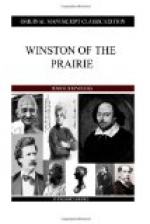CHAPTER II
LANCE COURTHORNE
It was late when Winston reached his log-built house, but he set out once more with his remaining horse before the lingering daylight crept out of the east to haul the wagon home. He also spent most of the day in repairing it, because occupation of any kind that would keep him from unpleasant reflections appeared advisable, and to allow anything to fall out of use was distasteful to him, although as the wagon had been built for two horses he had little hope of driving it again. It was a bitter, gray day with a low, smoky sky, and seemed very long to Winston, but evening came at last, and he was left with nothing between him and his thoughts.
He lay in a dilapidated chair beside the stove, and the little bare room through which its pipe ran was permeated with the smell of fresh shavings, hot iron, and the fumes of indifferent tobacco. A carpenter’s bench ran along one end of it, and was now occupied by a new wagon pole the man had fashioned out of a slender birch. A Marlin rifle, an ax, and a big saw hung beneath the head of an antelope on the wall above the bench, and all of them showed signs of use and glistened with oil. Opposite to them a few shelves were filled with simple crockery and cooking utensils, and these also shone spotlessly. There was a pair of knee boots in one corner with a patch partly sewn on to one of them, and the harness in another showed traces of careful repair. A bookcase hung above them, and its somewhat tattered contents indicated that the man who had chosen and evidently handled them frequently, possessed tastes any one who did not know that country would scarcely have expected to find in a prairie farmer. A table and one or two rude chairs made by their owner’s hands completed the furniture, but while all hinted at poverty, it also suggested neatness, industry and care, for the room bore the impress of its occupier’s individuality as rooms not infrequently do.
It was not difficult to see that he was frugal, though possibly from necessity rather than taste, not sparing of effort, and had a keen eye for utility, and if that suggested the question why with such capacities he had not attained to greater comfort the answer was simple. Winston had no money, and the seasons had fought against him. He had done his uttermost with the means at his disposal, and now he knew he was beaten.
A doleful wind moaned about the lonely building, and set the roof shingles rattling overhead. Now and then the stove crackled, or the lamp flickered, and any one unused to the prairie would have felt the little loghouse very desolate and lonely. There was no other human habitation within a league, only a great waste of whitened grass relieved about the homestead by the raw clods of the fall plowing, for, while his scattered neighbors for the most part put their trust in horses and cattle, Winston had been among the first to realize the capacities of that land as a wheat-growing country.




